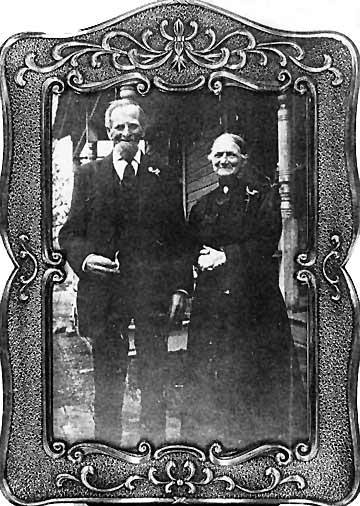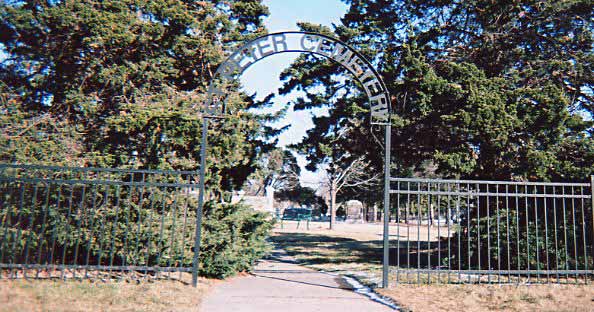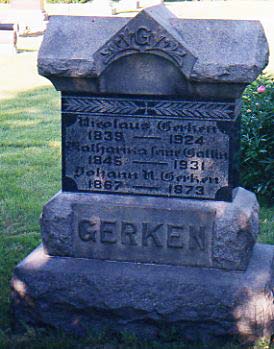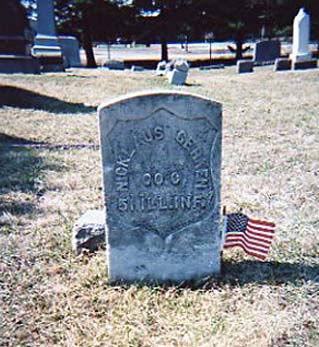 Nicolaus Gerken
Nicolaus GerkenPrivate, Company C
 Nicolaus Gerken
Nicolaus Gerken
Private, Company C
Nicolaus Gerken ("Yerkin" in military records) was born in Germany in 1839. The picture on this page shows Nicolaus and his wife Katharina on their Fiftieth Wedding Anniversary in Glenview, Illinois.
Military Service. Gerken was drafted in the autumn draft of 1864 and enrolled and mustered in at Chicago on September 26, 1864. The term of his service was to be one year. Nicolaus was assigned to Company C of the Fifty-First Illinois on October 21, 1864. At the time the regiment was at Chattanooga, on the verge of defending against John Bell Hood's attack into Tennessee. There was little time for training and conditioning for Gerken and the other recruits. The enemy was coming.
Edward Tabler of Company K wrote that the regiment was, "now at this place, Pulaski, Tenn. And fortifying against an attack, as they say Hood is coming with 30,000 men to take the place. The weather is cold and rainy, and the roads wet and muddy... We got, while we were at Chattanooga, 200 recruits and drafted men for our Regt., and they stand it pretty well. On our march from Athens to this place, the roads was very muddy, and the worst of mud, sticky slippery clay, where a man will slip back about as fast as go forward. On one day we made 18 miles on such roads, and I tell you it was no fun for me and others more able, to say nothing of new recruits."
And so Nicolaus and his fellow recruits were initiated, marching.
If the two hundred recruits had enrolled two months later, they would have "missed" some of the worst times—one might even say the very worst times—of the Fifty-First Illinois' course through the war, but as it was they had to live through, fight through, survive, Spring Hill and Franklin and the Battle of Nashville in the course of two and one-half weeks from November 29 to December 16, 1864. At Franklin bumbling, oblivious generals almost lost the Federal army. The Fifty-First Illinois, its five brigaded sister regiments, and John Q. Lane's Brigade paid the highest price for the generals' failure. A chronicler of the Fifty-First wrote in summary of the "night of horror" and the day leading up to it:
On the morning of the 30th at 5 o’clock, the army was moving towards Franklin passing the enemy’s lines so closely that our troops supposed them our own men. Arriving at Franklin at 11 o’clock A.M. the Regiment together with the other regiments of the 3d Brigade and also the 2nd Brigade were posted some five hundred yards in advance of the main line of works. The enemy appearing suddenly in force and this position being indefensible for so small a force, the 2nd Brigade having already fallen back to the main line in good order, we were swept back in confusion to the main line, sustaining a heavy loss. The ground from the first position to the main line being an incline plane sloping toward the river, destitute of tree stumps, stones, fences, hillocks, or anything behind which a person could take shelter, was the cause of so severe a loss. Lieut Thomas was killed. Captain Tilton, Lieut J. J. Johnson, Lieut Charles Hills wounded, the last two (2) so severely as to be discharged for physical disability. Lieut. O. D. Butler was taken prisoner and fifty-two (52) enlisted men killed and wounded, ninety-eight (98) missing, many of whom were killed and many cannot be heard from. The regimental records still remain open [August 1865] and efforts still being made to ascertain what was the fate of very many of those men. The same night the army crossed Harpeth River and commenced a gloomy, midnight march towards the entrenchments of Nashville, Tenn. All speak of this night as a night of horror. Men slept as they walked the road; others fell out exhausted and falling asleep by the roadside were picked up by the enemy.
(John Shellenberger's thirty-page booklet tells the story of Franklin, its generals and the flight for safety from the front line. Shellenberger made the race along with Gerken and his regimental mates: http://books.google.com/books?id=chCdAPF8DAAC&dq=shellenberger+%2B+franklin&source=gbs_summary_s&cad=0)
 |
|
 |
 |
Of the regiment's 44 killed and mortally wounded at Franklin 26 of the casualties were among the band of recruits, Gerken's comrades. Of the regiment's 56 missing men who eventually ended up imprisoned in Andersonville, Georgia and Cahaba, Alabama not quite thirty-five percent were "new" recruits. Gerken himself traversed the 500 yards from the exposed front line to the main works without capture or serious wound, and then survived the fighting at the main works and the night of horror as the Federal army sleep-walked toward Nashville.
Like many of the September-October 1864 recruits who were still alive and still with the regiment Nicholas was mustered out in June 1865, six months after the regiment's last fighting day but three months before its last day of service in Texas.
After the war.
Gerken died in 1924 and was buried in the St. Peter cemetery at Northbrook (then Shermerville), Illinois. Katharina lived until 1931.
Sources:
Many thanks to Nicholas Kaup of Northbrook, Illinois for the photograph and family information. Mr. Kaup is Nicolaus Gerken's great grandson.
Nicolaus Gerken, Compiled Service Record, Records of the Adjutant General's Office, 1780's-1917, Record Group 94, National Archives and Records Administration, Washington, D.C.